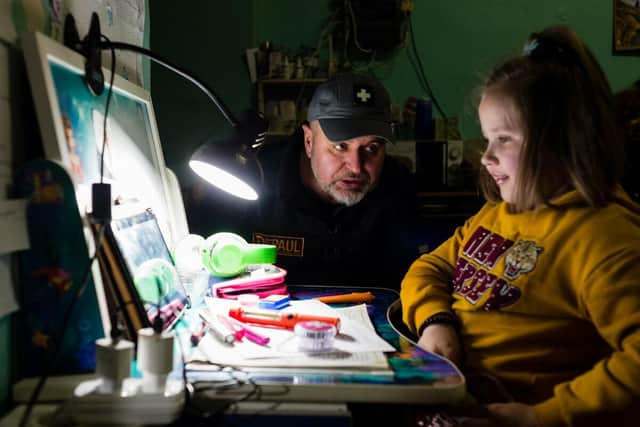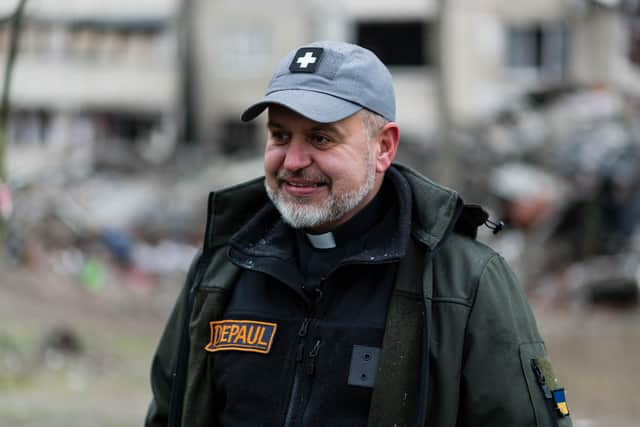Ukraine one year on: 'Every day, some other village or city is destroyed', says Ukrainian priest
"They came to me and said ‘Father, we have a shelter and there are millions of people who lost everything, we are in better conditions than them’.”
He quickly expanded the shelters in Kharkiv, Kyiv and Odesa to provide support for refugees displaced within Ukraine after their homes were destroyed by Russian bombs, or who were forced to flee conflict hotspots to other areas of the country.
Advertisement
Hide AdAdvertisement
Hide AdChief executive of charity Depaul Ukraine, which supported around 8,000 people a year until the invasion began in February last year, Father Vitaliy now estimates more than 400,000 people have used his services, including rebuilding damaged homes and providing food to those in desperate need, since the invasion began.


Many of his original service users have opted to volunteer to help those hit hardest by the war.
"These guys who are homeless, who are using our services, they are now helping us in the humanitarian field,” he says. “When the truck comes with humanitarian aid and we need to unload it and prepare the food boxes, these guys are very happy to join and help. They say ‘we have nothing, but we do have our hands to help those on the front line’.
"I see this as very positive that these people in the Kyiv shelter and the Kharkiv shelter are involved in the humanitarian programme.”
The Catholic priest has since worked tirelessly for the humanitarian war effort, with the help of partner organisations, including the UK's Disasters Emergency Committee, which distributes money across charities working on the ground. He has set up three psychological support centres for children affected by the invasion in Ukraine’s biggest cities and has distributed food, aid and winterisation packages across eastern Ukraine.


"We do a lot and we grow a lot, but it is still not enough, in the scale and size of the destruction which this war brings," he says. “We saw what is happening to people, how big and deep the humanitarian crisis is and we wanted to react as fast as possible. We grow, but it is a few drops in the ocean of the millions of people who need help.”
He regards the humanitarian movement as equivalent to the fight on the battlefield.
"We want to save lives in the humanitarian field,” he says. “Someone is saving us, on our land with weapons and protecting us. But a lot needs to be done to make sure no-one is dying from hunger, or without water, or in their cold flats. We are preventing people from death.”
He praises his team of workers and volunteers.
Advertisement
Hide AdAdvertisement
Hide Ad"Everyone had to answer this question when the first rockets came, on February 24 last year – ‘what are we going to do? Are we running, or are we remaining here?’ If you want to help, there is no way to do it without risk, especially in the war.
"People who stayed found a place in a bomb shelter, but they were dependent on someone bringing them food and water. Brave volunteers said ‘yes, even if it is dangerous, we will do it’.”
A lot of his charity’s work is concentrated in the devastated Mykolaiv region, in the south of Ukraine, where bitter battles were fought between advancing Russian soldiers and Ukrainian troops, before the occupying soldiers were pushed back, further to the east of the country.
"A lot of houses are damaged completely – this was where the front line was, just some months ago - but people still want to live in them, so we repair the roofs,” he says. “There is obviously no heating, so we find wood and other ways of making warmth. It is never ending.
"On the front line, there is still a need for food boxes, all the things that were necessary at the beginning of the war. It is not finished yet, the need is still there."
Father Vitaliy describes the devastation in the former occupied regions.
"This week, it was Ash Wednesday, but I see this ash everywhere,” he says. “Some cities don't exist anymore, some villages are smashed to ash. The more this war goes on, they ruin us, more and more.
"Every day, some other village or city is destroyed and the houses of people, the infrastructure, is destroyed. It means people run away and also, people who are refugees across Europe are not able to return or know when they will be able to return.”
Advertisement
Hide AdAdvertisement
Hide AdHe has helped former service users who, before the war, had managed to secure a home and a job – but found themselves homeless once more as the economic implications of the conflict began to bite.
"Those who had made positive steps towards an independent future, they had found a job and could rent something – now when this crisis began, many things stopped immediately, so they are returning to us," Father Vitaliy says.
In Kharkiv, a city that has suffered heavy attacks from Russia, which occupied some of the territory around the site, some people have lived in bomb shelters for months. The psychological effects of living underground have taken their toll.
"There were some people who were there almost eight months,” says Father Vitaliy. “Only in September, when the Russian army left this region, they started to leave.”
He recalls one elderly lady he met in a shelter under a university building in Kharkiv who told him she had been in the same shelter during the Second World War.
"She told me 'I was a young girl then, now I am again here’,” he says.
The charity has also installed 500 windows in flats in the hardest-hit suburbs of the city.
"Everybody knows now that Kharkiv is the city without windows,” he says, referencing heavy Russian shelling in the eastern city, which has shattered glass windows in hundreds of homes, leaving properties and their inhabitants freezing in sub zero winter temperatures. “It means people are without warmth.”
Advertisement
Hide AdAdvertisement
Hide AdChildren in Ukraine are in their third year of isolation, with the war following closely after a long period of Covid lockdowns.
"We have lost a lot,” says Father Vitaliy. "When we started to communicate with people in the shelters and ask them what they needed, of course at first, it was food. But very soon, it was clear they have trauma. They are afraid to go out in the sun, children as well.”
The charity set up psychological trauma centres, starting with a pilot centre in Kharkiv and soon expanding to Odesa and Mykolaiv.
"Now they started to overcome this fear, to go out and interact, to grow and continue to play and do crazy things like children want to do – we were so happy,” says Father Vitaliy.
He believes the effects of trauma are widespread.
"We are not able to say that everybody is OK in this country now,” he says. “Many of us are traumatised very directly because of what we have gone through.”
He is visibly surprised to be asked how he, personally, is coping with the demands of the war and the responsibility for supporting his fellow Ukrainians.
"Me? I get up in the morning, I go to the chapel, I pray at least an hour, two hours – after that I know I can go,” he says.
He pauses. “Sometimes, I have a good shot of whisky – Jack Daniels – that is enough. And then I go.”
Comments
Want to join the conversation? Please or to comment on this article.